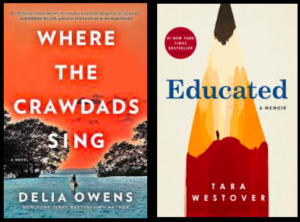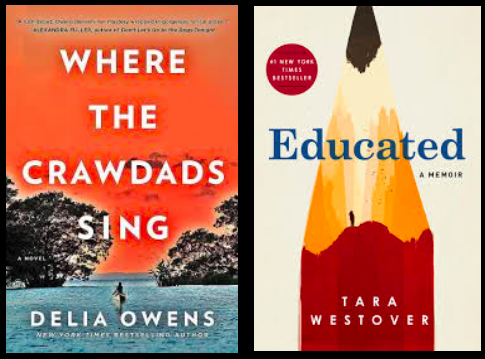What is the nature of empathy? Can we really see through the eyes of those with radically different life experiences? Are we getting any better at this critical social construct, or just hoping that we will?
 Over the winter break I read two profound must-read books, written by or about women who have lived lives that are hard for any of us, much less a west coast, white, man who grew up in the suburbs, to imagine. If you have not read these yet, do yourself a favor and put them both on your, and your students’ reading lists.
Over the winter break I read two profound must-read books, written by or about women who have lived lives that are hard for any of us, much less a west coast, white, man who grew up in the suburbs, to imagine. If you have not read these yet, do yourself a favor and put them both on your, and your students’ reading lists.
Where the Crawdads Sing is one of the most beautifully written books, and profound stories, I have read in a very long time. It is the story of a young girl growing up in the swamps of tidelands North Carolina, abandoned first by mother and siblings and eventually by her abusive alcoholic father, to fend for herself at about the age of ten. She is shunned by the local white community who treats her as if she were an animal, perhaps even below, in their perverse social hierarchy, the inhabitants of Colored Town. Through the help of one boy and a lot of self-training, she educates herself, and not only survives, but thrives. The writing and story are good enough to bring both tears and a hard look at ones’ own life, to force the question, “do I see others around me, the downtrodden, the homeless, or those who don’t speak my language, in this way?”
Educated is an early autobiography by Tara Westhover, who was raised in rural Idaho by a family of fundamentalist Mormon-survivalists, enduring horrendous levels of mental and physical abuse. She was not allowed to go to school, and even in the face of life-threatening accidents was denied access to doctors and hospitals. Her parents, and ultimately her family, forced her to choose between their medieval and often paranoid mythology and her own self-value as a human being. Through sheer determination she educated herself, eventually receiving a PhD from Cambridge via BYU and Harvard. Westhover is making quite a name on the speaking circuit, sharing a story of understanding, desperation, dissonance, and growth that is all but impossible for the rest of us to understand.
Both of these books are about family, personal struggle, and learning. They are profoundly personal and compelling. They demand that we look at our own lives; question that which we see as hard or challenging; and how we see, or don’t choose to see, those around us who are struggling. Perhaps most importantly, they demand that we ask how, in a nation so blessed, do we allow the least of us to suffer? Where were “we”, the other responsible members of the community, when these little girls needed us to speak up for them?
There are those who dismiss the adage that it takes a village to raise a child; who say that what parents do with their kids is not anyone else’s business. I cannot disagree more. A civilized society is not known by what we allow to happen in the name of personal freedom, but by how well we protect innocents who cannot protect themselves.












Leave A Comment